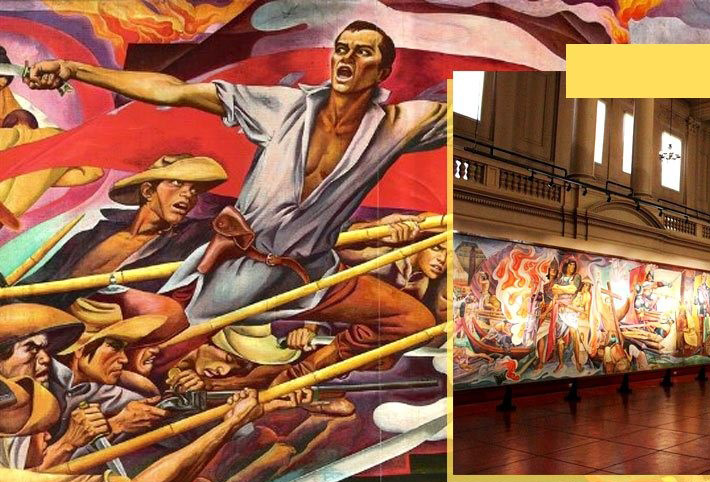BY RADO GATCHALIAN (The FILOsopher)
When man possesses the feeling of power he feels and calls himself good: and it is precisely then that the others upon whom he has to discharge his power feel and call him evil!”
— Friedrich Nietzsche (1844-1900)
OF ALL THE STORIES in our history: there is one moment we must NEVER forget. The tragic death of Andres Bonifacio, the father of Philippine Revolution. On 10th of May 1897, Andres Bonifacio and his brother Procopio were shot at Mount Nagpatong, near Mount Buntis, Maragondon, Cavite. They were convicted of sedition and sentenced to death.
PHOTO – ABS-CBN photo of portion of Botong Francisco mural about Andres Bonifacio found at Manila City Hall
The most tragic part in our history is that Andres Bonifacio, second or equal to Jose Rizal, died in the hands of his fellow Filipinos. His death sentence was signed by General Emilio Aguinaldo, the first Philippine President and the man who declared our independence from Spain on 12 June 1898.
The irony of all ironies in Philippine history. The father of Philippine revolution killed under the order of the first Philippine President.
To add: both were masons. Even this fraternal brotherhood did not save our Supremo from untimely death. Truly, there is no order in this chaos!
The last breath of the Supremo as he was gazing the sky above marked the darkest hour of Philippine politics. Andres died because of Filipino’s thirst for power, fame, control, and influence.
As we study the succeeding years of Philippine politics: the trickery, manipulation, vote buying, corruption, regionalism, personal interest, and political immaturity — everything goes back to the injustice suffered by Andres Bonifacio. Perhaps, this was the genesis of Philippines’ dirty politics.
The politics became so dirty that we no longer see the difference between gold and mud. The wolves wrapped on sheep’s fur walk in our midst. This cultural enigma where morality is measured not by the amount of virtue but by the amount of money has subconsciously clouded our Filipino mentality.
We need to reflect and find the wisdom to distinguish between a hero and an evil. Now: a historical debate and (mis)interpretation challenges all of us whether Marcos and Aquino are either a hero or a villain. The same with Aguinaldo.
We are in a complex time where our interpretations could not be based in truth but in our emotions, biases, and limited knowledge. This takes us to a dangerous zone where all of us could not see the right path to historical truths. We will all fall to a cultural cliff where our sense of Filipino collapses.
This brings us to an examination of our conscience as a Filipino: how can we remain so quiet and naive that the man whom we owe so much, Andres Bonifacio, was killed by our very own Emilio Aguinaldo?
As we reflect this historical tragedy, may we find the answers to this immortal question: “Why are Filipinos not united?”
Look around and see why we are not different from Emilio Aguinaldo!
We kill our own brothers and sisters. It may not be through guns and bullets but we kill our own race through endless gossips, jealousy, materialism, greed, thirst for personal glory, and backstabbing.
This moment of personal choice as a Filipino — whether we become Magdiwang or Magdalo: determines the future of our country (and history).
To become a hero or a traitor to our land — begins to that personal choice of loving or condemning our very own Filipino brothers. If blood is thicker than water: let this invisible blood compact of Andres Bonifacio remind us on the death (and birth) of our identity as a Filipino.
There is hope. It flows in our blood.
The color is not red but kayumanggi.







Leave a Reply